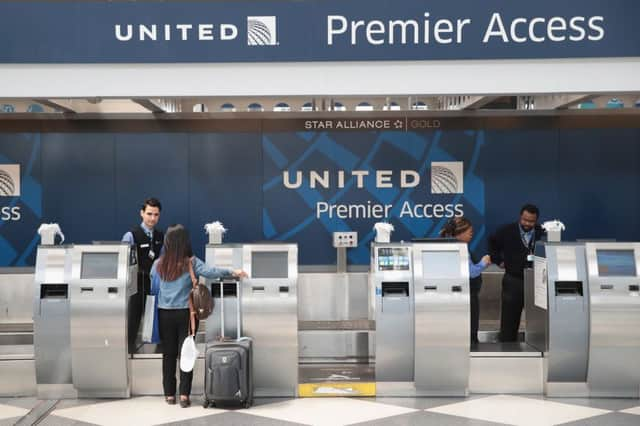Jane Bradley: Airline are taking liberties with customers


Whenever you take a flight, there is always a risk that you could turn up at the airport to find there is not a seat for you.
Instead, you could be booked on to a later flight, which won’t get you to where you are going on time. Or in an extreme situation, where there are no more flights to your destination that day, you may be put up in a hotel, or possibly be whisked to another airport, miles away from your home and then stuck in a taxi at the expense of the airline to get you home – hours late.
Of course, it wouldn’t wash in any other industry.
Advertisement
Hide AdAdvertisement
Hide AdYou wouldn’t go into a shop and hand over £30 for a new top, only for the cashier to pop the cash in the till, then turn around and say “Well, we don’t have the actual top you selected and paid for, but if you sit down quietly over there, we’ll give you this one in a few hours time, which you didn’t choose and which doesn’t fit in with the rest of your wardrobe at all. You can accept that one instead, or you can choose to just walk away – without your money or the item you wanted.”
Airlines opt to overbook flights and bump passengers – otherwise known as “involuntary denied boarding” – for purely commercial reasons. They know, from experience, that a certain proportion of passengers will not turn up for their flight. They may have become ill, a business trip might be cancelled, a family emergency may have arisen.
However, on the occasion when more passengers appear than there are seats on the aeroplane, problems arise.
Airlines are supposed to ask for volunteers to step down and accept a later flight, in return for compensation. For some, this might be a bonus. On one occasion in our younger days, the chance to stay overnight at Heathrow in return for a few hundred quid and miss the first day of a holiday in Canada was a no brainer – it pretty much paid for the trip.
But if too few volunteers come forward, however, they are allowed to “bump” passengers, based on things like when they bought the flight, or how much they paid for it. There have been cases recently of passengers being dragged from planes after refusing to give up their seats. One man was forcibly removed by police from an overbooked flight leaving Chicago earlier this year after the airline randomly selected him from a plane-load of people – after he had settled down in his seat.
Online check-in rules, which differ massively from airline to airline, sometimes give passengers up to 30 days before their flight to check in, meaning that someone who waits until just hours or even days before their departure, runs the risk of failing to get a seat on the aircraft.
My husband was in this very position last week. Having tried to check in online around ten hours before he was due to depart on a domestic flight with EasyJet, he received an error message on the company’s website telling him it was not possible for him to do so and he should “speak to an agent” at the airport.
Assuming it was a website technical problem, he headed to the airport 90 minutes before his flight – to be told it was already full. Every seat had already been checked in and there were nine people who had a ticket for the flight but no seat.
Advertisement
Hide AdAdvertisement
Hide AdWhat was worse was the woeful tale of a fellow passenger who had tried to check in immediately after buying the flight, five days earlier. He had received the same error message as my husband, meaning that this particular flight had been fully checked in – and therefore unable to allow any more passengers to travel on board – while the airline was still selling tickets to unsuspecting travellers.
It is usually only budget airlines – EasyJet, Ryanair, Wizz – which offer the 30-day practice. Other carriers, such as British Airways, open check in just 24 hours early – when a passenger is in a position to actually check in.
EasyJet also insists that overbooking does not affect 97 per cent of cases, “meaning that many tens of thousands of customers who want to fly, get to do so”. Meanwhile, a “tiny fraction of less than 1 per cent” – will be denied boarding.
“This is because around three million EasyJet customers each year don’t show up for their flight and if we flew these seats empty, it would force up prices for everyone else,” a spokeswoman tells me.
Or, of course, the company could absorb the cost. It may have had a near-30 per cent drop in profit last year, in a year of “significant challenges” for the firm, but it still stood at a fairly healthy £495 million – and it was the first profit fall since 2009.
Airlines have no idea why a passenger is travelling – they are not in a position to compare one person’s family crisis against another’s long-awaited holiday, or someone’s urgent business meeting with a trip for a child to visit grandparents for the first time in however long. It should not be up to them to decide which passengers are denied boarding.
They need to sort out this archaic practice – and allow all passengers to get the service they have paid for.